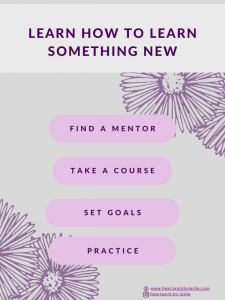This post may contain affiliate links, which means we may receive a commission, at no extra cost to you, if you make a purchase through a link. Please see our full disclosure on the Affiliate Disclosure Page.

With a new year around the corner, do you have plans to learn something new? I try to learn something new all the time. I love taking classes to learn things. If I could afford it, I would attend school almost all the time. So, I really do attempt to learn things when I can.
For the new year, I want to return to learning piano. I may possibly also use videos for guitar. Both instruments are in my house currently, but I haven’t taken the time to learn them. I took piano lessons for about a year when I was younger and for a semester in college. I can handle the notes on the right hand very well. It’s the left hand that gives me problems.
Why Learn Something New?
There are a few reasons to learn something new.
First, it could be beneficial to your current career path. You could learn a skill to help you earn a promotion or raise in your job.
Second, it could lead you to a new career. If you learn something new that you really enjoy, you may decide to change to a different career than the one in which you currently work.
Third, it could lead you to new hobbies and/or possibilities. You can check out my posts here about starting a new hobby.
Things To Do Before You Learn Something New
Set Your Goals
Short-term goals help with progress monitoring while you learn, but long-term goals can help you to establish new ways to overcome obstacles over time.
Know Your Current Skills
When you begin to learn something new, you need to know where to start. If you want to learn a new language, do you know any words already? Do you need to learn the alphabet first?
If you are learning to sew, do you already know how to make a straight line? Can you read a pattern?
Figure out what you know about the skill or subject already and then begin learning the rest of the information.
Take Note of Possible Barriers and Obstacles
Are you going to need to take a class? How much will it cost?
Do you need supplies? Is it something you already have, or do you have to purchase them?
How much time is this going to take you? Where will you find the time to do it?
Be sure to have patience with yourself. No matter what comes your way when you learn something new, you need to give yourself grace. Learning is not always easy.
Find Something You are Passionate About
The more you want to learn something, the more likely you are to stick with it. If you have a passion for it, you are likely to use it in your life as well.
Talk to Someone Who Already Knows the Skill or Subject
Ask him/her to be a mentor for you. This will give you someone to ask questions. You can also ask for tips and tricks for how to learn the new information. Finally, ask how he/she learned the information. Knowing this will help you to be able to plan how to learn the new skill or subject for yourself.
Ways to Learn Something New
 There are a lot of ways to do it. You have to choose what is best for you from the available options. Of course, you can always mix and match the choices to come up with the best way for you to learn something new. No matter how you choose to learn most of the information for your new skill or subject, use a variety of tools and materials.
There are a lot of ways to do it. You have to choose what is best for you from the available options. Of course, you can always mix and match the choices to come up with the best way for you to learn something new. No matter how you choose to learn most of the information for your new skill or subject, use a variety of tools and materials.
For most topics, there are books, classes, videos, and/or websites. The best ones for you will depend on what subject or skill you want to learn.
Immerse Yourself in the Learning Process
Focus on learning and not on other things. Eliminate distractions. If you need help with that, you can read more about it here.
Learn in Short Sessions
Take 20-30 minutes at a time to learn and/or practice. This is not something you can do in a few marathon sessions. When we spend a long time working, our attention to it wanes.
Write Down Everything
When you write things down, it makes your brain think that it is important. You are forcing yourself to take what you see, hear, read, or think and put it into written form. Your brain remembers it more easily.
Focus on the Fundamentals First
At the beginning of learning something new, focus on the most important elements of the subject or skill you have chosen.
For example, if you have decided to learn a new language, if you learn the 2,000 most common words in the language, you have learned about 80% of it. You can probably use that to help you communicate with a native speaker of the language in a short conversation. Of course, you also need to learn sentence structure and other things to communicate as effectively as possible, but you can likely get a point across with those 2,000 words.
Find a Way to Self-Correct
This may come through watching and rewatching a video with information in it. It could be reading a book or notes, time and time again, but it may also be a mentor who knows the information telling you if it is correct or not.
This needs feedback, preferably immediate feedback. If you get the new information correct, you feel rewarded for your knowledge. It also helps you not to practice or rehearse incorrectly.
Practice Consistently
I grew up hearing “practice makes perfect,” and I’m sure you’ve heard that too. However, it’s not correct.
Only perfect practice makes perfect. If you practice incorrectly, you learn incorrectly. Practicing something the wrong way will make it a hard habit to break later.
The more times you do something, the brain makes it more important. You will probably remember more of it.
Teach Someone Else
Focus on what is important from what you have learned. Teach it to another person. If you can do this, then you have internalized the information well enough to be able to add more to it.
Resources to Use to Learn Something New
MOOC
Massive Open Online Courses are free courses from colleges, universities, and research institutions.
Online Platforms
You can find classes (that you pay for) online at places like MasterClass, SkillShare, Udemy, and Coursera.
Community Resources
Places like churches, schools, community colleges, community centers, and other places often offer courses. Look online or ask friends/family for suggestions.
New Skills or Subjects to Learn

–a new language
–basic home repairs
–basic car repairs
–sewing
–photography
–public speaking
–a musical instrument
–budgeting
–gardening
–self-defense
–CPR and First Aid
–singing
–anything else you want to learn
Conclusion
Find something you want to learn. Immerse yourself in learning it. Give yourself grace and show patience in learning something new.
In the comments, tell me what you want to learn in the new year. How are you going to learn it? Share your goals and accomplishments with me.
